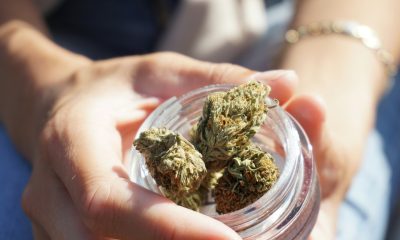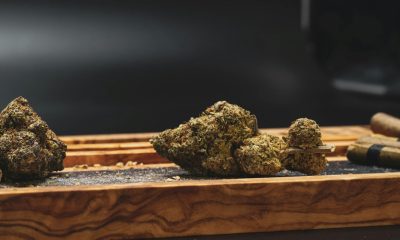Cannabis
Rio de Janeiro approves law for research and cultivation of medical cannabis
At the moment, there are 78 judicial authorizations for the individual cultivation of cannabis for exclusively medicinal purposes in Brazil. Rio de Janeiro will be the first state to allow the cultivation of cannabis by patient associations, through a new law voted by the majority of politicians. Rio de Janeiro is the first state in Brazil to approve such a law.

Rio de Janeiro is the first Brazilian state to pass legislation for the cultivation and research of cannabis for medicinal purposes. The new legislation follows the 78 court authorizations (Habeas Corpus) for self-cultivation by patients.
If you want to be the first to read the latest cannabis news in the world, download for free the Hemp.im mobile app.
The majority of politicians voted for the new cannabis law
It was a tight vote, but 41 state deputies in Rio de Janeiro passed the first law to support research and cultivation of medical cannabis in Brazil. The text, written by Carlos Minc, guarantees support and guidance to patients and relatives who need the use of the cannabis plant, stimulating its dissemination and possibilities to health professionals.
The politicians, who had already approved the text in March, overthrew the full veto of the governor of RJ, Wilson Witzel. Among the parliamentarians, many were conservatives or policemen, but they started to support the project after meeting children who improved the quality of life by using cannabis-based products.
“Rio de Janeiro is the first state in Brazil that will have a law to support medical cannabis research, and we will have funds for this, which also determines support for families. Especially children and adolescents who need cannabidiol for which Anvisa (Brazilian health agency) gave its approval, but it has to be imported, and it is very expensive. So the project is not about drug policy, it’s about health, research, and social assistance. We are going to fight obscurantism and prejudice, support these families who have to go to court to plant cannabis at home,” said Carlos Minc.
With the fall of the veto, the law comes into force immediately. Among the entities that will promote research for the medicinal use of the cannabis plant are the Vital Brazil Institute, the Oswaldo Cruz Foundation, and the Rio de Janeiro State Research Support Foundation (Faperj). According to the author of the project, the law is important because the great majority of patients do not have financial conditions to import the product or to buy it in the pharmacy, much less can they count on legal advice to get a Habeas Corpus (HC) to the home cultivation.
At the moment, in Brazil, there are 78 judicial authorizations for the individual cultivation of cannabis for exclusively medicinal purposes. The last concession was for a cancer patient in the State of São Paulo, granted on Saturday, June 6th. The data were presented last Friday, June 5th by the lawyer Emílio Figueiredo, during one of the sessions of PTMC Talks (Portugal Medical Cannabis).
Patient associations will be allowed to plant cannabis
The new law approved in Rio de Janeiro regulates the cultivation of cannabis for medicinal purposes by patient associations. However, only in cases authorized by federal legislation. Patient associations may also hold conventions and partnerships with educational and research institutions, aiming to support the analysis of drugs in order to ensure standardization and safety for the treatment of patients.
Apart from the 78 individual authorizations, only one patient association has judicial authorization for the planting of cannabis in Brazil, Abrace Esperança, in the state of Paraíba. The permit, however, is a preliminary injunction and awaits final judgment by the Federal Supreme Court (STF).
For most Brazilians who need cannabis derivatives to treat their diseases, the most common form is importation, upon authorization from Anvisa. Two products are also available in pharmacies, Sativex, which costs around $542 (€480), and Cannabidiol (CBD) from Prati-Donaduzzi, at $426 (€375). The price, however, is inaccessible to the standards of living of Brazilian citizens.
__
(Featured image by LhcCoutinho via Pixabay)
DISCLAIMER: This article was written by a third party contributor and does not reflect the opinion of Born2Invest, its management, staff or its associates. Please review our disclaimer for more information.
This article may include forward-looking statements. These forward-looking statements generally are identified by the words “believe,” “project,” “estimate,” “become,” “plan,” “will,” and similar expressions. These forward-looking statements involve known and unknown risks as well as uncertainties, including those discussed in the following cautionary statements and elsewhere in this article and on this site. Although the Company may believe that its expectations are based on reasonable assumptions, the actual results that the Company may achieve may differ materially from any forward-looking statements, which reflect the opinions of the management of the Company only as of the date hereof. Additionally, please make sure to read these important disclosures.
First published in CANNA REPORTER , a third-party contributor translated and adapted the article from the original. In case of discrepancy, the original will prevail.
Although we made reasonable efforts to provide accurate translations, some parts may be incorrect. Born2Invest assumes no responsibility for errors, omissions or ambiguities in the translations provided on this website. Any person or entity relying on translated content does so at their own risk. Born2Invest is not responsible for losses caused by such reliance on the accuracy or reliability of translated information. If you wish to report an error or inaccuracy in the translation, we encourage you to contact us.

-

 Biotech2 weeks ago
Biotech2 weeks agoEurope’s Biopharma at a Crossroads: Urgent Reforms Needed to Restore Global Competitiveness
-

 Africa7 days ago
Africa7 days agoFrance and Morocco Sign Agreements to Boost Business Mobility and Investment
-

 Impact Investing2 weeks ago
Impact Investing2 weeks agoItaly’s Listed Companies Reach Strong ESG Compliance, Led by Banks and Utilities
-

 Fintech4 days ago
Fintech4 days agoFindependent: Growing a FinTech Through Simplicity, Frugality, and Steady Steps

























